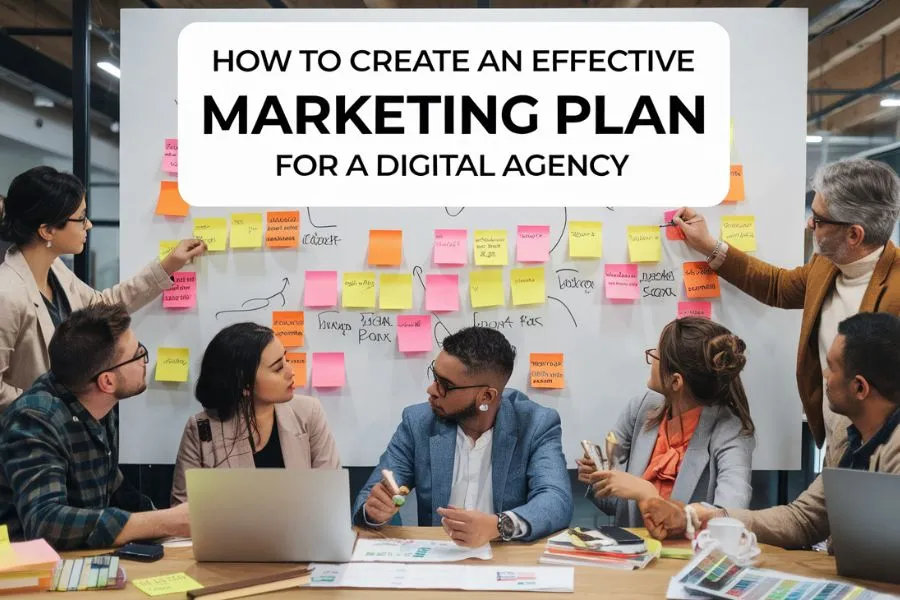Table of Contents
Creating a solid marketing plan for a digital agency is crucial for both growth and long-term success. Having a structured plan that outlines your agency’s strategies, target audience, and goals is key to staying competitive and attracting new clients. In this guide, we’ll break down the steps to develop a marketing plan for a digital agency.
Why a Marketing Plan for a Digital Agency is Essential
A marketing plan for a digital agency serves as a roadmap to navigate your business’s marketing activities. It helps align your efforts, set measurable goals, and track your progress. With clear objectives, you’ll be better equipped to attract clients, position your services effectively, and outperform competitors. By outlining your agency’s unique offerings, target audience, and marketing tactics, you ensure that every effort works towards achieving consistent growth.
Defining Your Unique Value Proposition (UVP) for Your Marketing Plan

1. What is a Unique Value Proposition (UVP)?
For any marketing plan for a digital agency, defining your Unique Value Proposition (UVP) is fundamental. Your UVP explains what sets your agency apart from competitors. It’s the core message that answers: Why should a client choose your services?
2. Highlighting Your Strengths in Your Marketing Plan
In the competitive world of digital marketing, it’s essential to identify your agency’s key strengths and focus on them. Are you excellent at SEO, social media management, or paid advertising? Whatever your core strengths, they should take center stage in your marketing plan.
3. Effectively Communicating Your UVP
Your marketing plan for a digital agency must include a clear strategy to communicate your UVP across all touchpoints, whether it’s on your website, social media, or email marketing campaigns. Consistency in messaging builds trust and sets client expectations.
Setting Clear Goals in Your Marketing Plan
Why Goal Setting is Crucial for Your Marketing Plan
For a successful marketing plan for a digital agency, setting clear, achievable goals is non-negotiable. Without specific objectives, your agency may struggle to focus on high-impact activities. Goals help measure success and adjust tactics where necessary.
Using the SMART Goals Framework
To structure your goals, use the SMART framework:
- Specific: Define what you want to achieve.
- Measurable: Set metrics to track progress.
- Achievable: Ensure your goals are realistic.
- Relevant: Align your goals with your agency’s long-term strategy.
- Time-bound: Set deadlines for achieving your objectives.
For instance, a SMART goal for your marketing plan for a digital agency could be: “Increase website traffic by 20% within 6 months through organic SEO efforts.”
Identifying the Target Audience for Your Digital Agency
1. Importance of Knowing Your Audience in Your Marketing Plan
A crucial step in any marketing plan for a digital agency is knowing exactly who you’re targeting. This ensures you tailor your services, messaging, and outreach to the right audience.
Example: A digital agency specializing in SEO might focus on small businesses struggling to rank in search results. By understanding their specific needs and challenges, the agency can tailor their services and messaging to effectively address their concerns.
2. Building Buyer Personas
Create detailed buyer personas to help you understand your clients’ needs, pain points, and preferences. This will guide your content creation, service offerings, and overall marketing efforts.
Example: A digital agency targeting mid-sized businesses in the healthcare industry might create buyer personas such as:
- Dr. Sarah: A busy general practitioner looking for a digital agency to improve her online presence and attract new patients.
- Marketing Manager Alex: A young professional responsible for the digital marketing strategy of a large hospital chain, seeking a partner to help with social media marketing and lead generation.
3. Tailoring Your Services to Audience Needs
Once you know who your ideal clients are, tailor your digital services to meet their unique needs. Whether they’re small businesses looking for affordable SEO solutions or large corporations in need of full-service digital marketing, your marketing plan should address these requirements head-on.
Example: A digital agency targeting startups might offer a package of services including website design, social media management, and email marketing at a discounted rate. This tailored approach addresses the specific needs and budget constraints of startups.
Competitor Analysis for Your Marketing Plan
1. Why Competitor Analysis is Key to Your Digital Agency’s Success
No marketing plan for a digital agency is complete without a detailed competitor analysis. Knowing who your competitors are, what they offer, and how they market themselves allows you to identify opportunities to differentiate your agency.
2. Competitor Research Tools
Utilize tools such as SEMrush, Ahrefs, and Moz to track your competitors’ performance in terms of keywords, content strategies, and backlink profiles. This research will give you insights into where you can outperform them.
3. Finding Gaps in Competitor Strategies
Identify gaps in your competitors’ services or customer experience, and position your agency to fill those gaps.
For example, if a competitor lacks expertise in video marketing, your agency can emphasize its strengths in that area.
Content Marketing Strategy for Your Digital Agency
The Importance of Content in a Marketing Plan for a Digital Agency
Content marketing is one of the most effective ways to showcase your expertise and attract clients. In your marketing plan for a digital agency, focus on creating valuable content that educates your target audience and drives leads.
Creating a Content Calendar
A content calendar ensures consistency in your content output. It helps plan blog posts, social media updates, case studies, and other materials that align with your goals.
Blog posts: These can cover a wide range of topics, from industry trends to case studies and tutorials.
Social media posts: Share short, engaging data on social media platforms like Instagram, Twitter, and LinkedIn.
Case studies: Showcase successful projects to demonstrate your agency’s capabilities.
Whitepapers: Provide in-depth analysis and insights on specific topics.
Ebooks: Offer comprehensive guides or resources on relevant subjects.
Infographics: Visualize complex data in a short visual way.
SEO Optimization and Engagement
Ensure that all your content is optimized for SEO to improve your search rankings. Use relevant keywords, meta descriptions, and internal links to drive traffic to your site, and make sure your content speaks directly to your audience’s pain points.
Keyword research: Identify relevant keywords that your target audience is already searching for.
On-page optimization: Use keywords in your headlines, meta descriptions, and body text.
Backlinks: Make high-quality backlinks from good websites to improve your ranking.
User experience: Create content that is easy to read, understand, and share.
Social Media in Your Digital Agency Marketing Plan
Leveraging Social Media for Client Acquisition
Incorporating social media into your marketing plan for a digital agency is vital. Social media platforms like LinkedIn, Facebook, and Instagram can help you connect with potential clients, showcase your portfolio, and promote your services.
Paid Advertising on Social Media
Social media advertising, such as Facebook and LinkedIn ads, can help you reach a broader audience. Include a budget and strategies for paid campaigns in your marketing plan to increase your visibility and attract high-quality leads.
Monitoring Your Marketing Plan’s Performance

Why Monitoring KPIs is Essential for Success
A successful marketing plan for a digital agency isn’t static—it evolves as your agency grows. Regularly track Key Performance Indicators (KPIs) such as website traffic, lead generation, conversion rates, and ROI from marketing efforts. This data will guide future decisions and adjustments to your plan.
Tools for Tracking and Analysis
Use tools like Google Analytics, HubSpot, and SEMrush to track the performance of your marketing campaigns. These platforms provide insights into which strategies are working and which areas need improvement.
Adjusting Your Marketing Plan Based on Data
If your current strategies aren’t yielding the desired results, make data-driven adjustments. Continuously refine your marketing tactics to stay competitive and ensure sustainable growth.
Conclusion
Crafting an effective marketing plan for a digital agency is an ongoing process that requires careful planning, monitoring, and adjustments. By clearly defining your UVP, setting achievable goals, understanding your audience, and leveraging the right marketing channels, you can drive growth and outperform your competition. A well-executed marketing plan not only helps attract new clients but also fosters long-term relationships, ensuring the continued success of your digital agency.
FAQs
1. Why is a marketing plan important for a digital agency?
A marketing plan helps align your strategies with business goals, target the right audience, and optimize efforts to attract and retain clients.
2. How often should a digital agency revise its marketing plan?
Your marketing plan should be reviewed at least every quarter to ensure it remains relevant and effective in the face of industry changes and performance metrics.
3. What are the essential elements of a marketing plan for a digital agency?
A marketing plan should include a clear UVP, SMART goals, audience analysis, competitor research, content strategy, social media tactics, and a performance monitoring system.
4. How can content marketing benefit a digital agency?
Content marketing helps establish your agency as an industry expert, improves SEO rankings, drives website traffic, and attracts potential clients by providing valuable information.
5. What tools can be used for monitoring a digital agency’s marketing performance?
Popular tools include Google Analytics, SEMrush, Ahrefs, and HubSpot for tracking traffic, keyword rankings, conversions, and overall marketing effectiveness.

